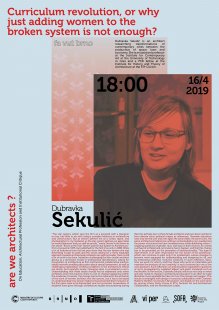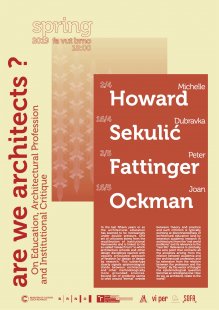
Are we architects? - Dubravka Sekulić
Source
FA VUT, SOFA, VIPER, AVU
FA VUT, SOFA, VIPER, AVU
Publisher
Tisková zpráva
16.04.2019 07:40
Tisková zpráva
16.04.2019 07:40
Lectures
Czech Republic
Brno
Dubravka Sekulić
The Faculty of Architecture of the Brno University of Technology, in collaboration with the Gallery of Architecture Brno, the Student Council of the Faculty of Architecture, and the architectural theory course “Pride and Prejudice” at the Academy of Fine Arts in Prague, invites you to a lecture “Curriculum Revolution, or Why Mere Inclusion of Women into a Broken System is Not Enough?” by architect Dubravka Sekulić, which is part of the lecture series “Are We Architects? On Education, the Architectural Profession, and Institutional Critique.” The event will take place on Tuesday, April 16, at 18:00 in lecture room A310 at the Faculty of Architecture, Poříčí 5, Brno. The lecture will be in English.
DUBRAVKA SEKULIĆ: CURRICULUM REVOLUTION, OR WHY MERE INCLUSION OF WOMEN INTO A BROKEN SYSTEM IS NOT ENOUGH?
"The system of architectural stars, in which the firm is a pyramid with the lead designer at the top, has little to do with today’s complex relationships in architecture and building. However, since sexism defines me as my husband’s scribe, recorder, and photographer, it thus defines our partners as inferior and our employees as mere pencils,” wrote Denise Scott Brown in her article “A Place at the Top? Sexism and the Star System in Architecture,” written in 1975 but first published in 1989. While events in the past year suggest that the star system Denise described is reaching its end, and voices demanding a more equitable approach to the architectural profession are growing stronger, we still have a lot of work to do. Initiatives questioning the figure of the architect-genius (man) as the dominant model of professional identity, demanding recognition of architecture as a practice primarily based on collaboration, calling for the creation of a safe framework for discussions about sexual harassment, and pointing out exploitative working conditions in architectural offices are slowly but steadily changing what is considered the norm. Understanding the situation and recognizing that these issues should not start to be revealed only when we enter architectural practice shows that many things are also changing in academia. However, change cannot be reduced to simply including the work of female architects into the acknowledged canon. Change must be based on understanding how power relations can be unwound and not merely corrected, as these have previously impeded their inclusion. Entire generations of students in architectural studies may have encountered only two or three names of female architects and even fewer references pointing to architects of diverse socio-political backgrounds. Educators repeatedly offered them the same slides, the same icons, the same architectural references without context or questioning of power structures. Through their selection, they elevated some and marginalized others, negating issues of gender, race, and social class. It is time for a complete upheaval in architectural curricula, and this change must stem from the principles of intersectionality. This type of intervention is extremely important for the future of a profession that can only continue to exist if its problematic culture changes – so that it is better equipped to understand design for all and includes collective and inclusive creativity. In such a case, work – the way we work, for whom, and the work of those who materialize and manage the products of our “creativity” – should not be a footnote but one of the key issues. Such reflection should also extend to questions of standards propagated by outdated ableist and sexist norms like those of Neufert. In her lecture, Dubravka Sekulić will focus not only on what and why we need to change in architectural education to make the discipline fairer but also on how such change can occur. This lecture is closely linked to her ongoing collaboration with Charlotte Malterre-Barthes on “Curriculum Revolution” and is particularly based on the work of the Parity Group at ETH Zurich, the Feminist Art and Architecture Collaborative, and the Architecture Lobby.
Dubravka Sekulić is an architect researching transformations of contemporary cities. She teaches at the Institute of Contemporary Art (TU Graz) and participates in research at the Institute of History and Theory of Architecture (ETH Zurich). She was a founding member of the Parity Group at the Department of Architecture ETH Zurich.
ARE WE ARCHITECTS? ON EDUCATION, THE ARCHITECTURAL PROFESSION, AND INSTITUTIONAL CRITIQUE
In the last fifteen years, architectural education has been under dual pressure. One direction stems from recalibrating the institutional framework of higher education and is associated with what is sometimes referred to as "the research turn". In response to increasing demands and performance in research, architecture and design schools have reacted with a vague approach called "research by design". This "dodge" clearly points to an epistemological boundary between architecture and more methodologically anchored scientific disciplines that conduct research without qualifiers. Essentially the same problem, but this time coming from outside, is often framed as the issue of theory and practice. This strand of criticism often points to the detachment of architectural education from real problems and the applicability of architectural research to real life. The question of relevance is precisely the acupuncture point that connects doubts regarding the relationship between academia and architectural practice, as well as doubts regarding the relevance of the architectural profession to contemporary "society." Through this process, what starts as an epistemological question about the nature of architectural teaching and research transforms into an ontological question: How do we, as architects, relate to the world around us, and what role do we want to play in it?
The lecture series “Are We Architects? On Education, the Architectural Profession, and Institutional Critique” is held with the financial support of the Ministry of Culture of the Czech Republic, the statutory city of Brno, and the AKTION program.
More information >
DUBRAVKA SEKULIĆ: CURRICULUM REVOLUTION, OR WHY MERE INCLUSION OF WOMEN INTO A BROKEN SYSTEM IS NOT ENOUGH?
"The system of architectural stars, in which the firm is a pyramid with the lead designer at the top, has little to do with today’s complex relationships in architecture and building. However, since sexism defines me as my husband’s scribe, recorder, and photographer, it thus defines our partners as inferior and our employees as mere pencils,” wrote Denise Scott Brown in her article “A Place at the Top? Sexism and the Star System in Architecture,” written in 1975 but first published in 1989. While events in the past year suggest that the star system Denise described is reaching its end, and voices demanding a more equitable approach to the architectural profession are growing stronger, we still have a lot of work to do. Initiatives questioning the figure of the architect-genius (man) as the dominant model of professional identity, demanding recognition of architecture as a practice primarily based on collaboration, calling for the creation of a safe framework for discussions about sexual harassment, and pointing out exploitative working conditions in architectural offices are slowly but steadily changing what is considered the norm. Understanding the situation and recognizing that these issues should not start to be revealed only when we enter architectural practice shows that many things are also changing in academia. However, change cannot be reduced to simply including the work of female architects into the acknowledged canon. Change must be based on understanding how power relations can be unwound and not merely corrected, as these have previously impeded their inclusion. Entire generations of students in architectural studies may have encountered only two or three names of female architects and even fewer references pointing to architects of diverse socio-political backgrounds. Educators repeatedly offered them the same slides, the same icons, the same architectural references without context or questioning of power structures. Through their selection, they elevated some and marginalized others, negating issues of gender, race, and social class. It is time for a complete upheaval in architectural curricula, and this change must stem from the principles of intersectionality. This type of intervention is extremely important for the future of a profession that can only continue to exist if its problematic culture changes – so that it is better equipped to understand design for all and includes collective and inclusive creativity. In such a case, work – the way we work, for whom, and the work of those who materialize and manage the products of our “creativity” – should not be a footnote but one of the key issues. Such reflection should also extend to questions of standards propagated by outdated ableist and sexist norms like those of Neufert. In her lecture, Dubravka Sekulić will focus not only on what and why we need to change in architectural education to make the discipline fairer but also on how such change can occur. This lecture is closely linked to her ongoing collaboration with Charlotte Malterre-Barthes on “Curriculum Revolution” and is particularly based on the work of the Parity Group at ETH Zurich, the Feminist Art and Architecture Collaborative, and the Architecture Lobby.
Dubravka Sekulić is an architect researching transformations of contemporary cities. She teaches at the Institute of Contemporary Art (TU Graz) and participates in research at the Institute of History and Theory of Architecture (ETH Zurich). She was a founding member of the Parity Group at the Department of Architecture ETH Zurich.
ARE WE ARCHITECTS? ON EDUCATION, THE ARCHITECTURAL PROFESSION, AND INSTITUTIONAL CRITIQUE
In the last fifteen years, architectural education has been under dual pressure. One direction stems from recalibrating the institutional framework of higher education and is associated with what is sometimes referred to as "the research turn". In response to increasing demands and performance in research, architecture and design schools have reacted with a vague approach called "research by design". This "dodge" clearly points to an epistemological boundary between architecture and more methodologically anchored scientific disciplines that conduct research without qualifiers. Essentially the same problem, but this time coming from outside, is often framed as the issue of theory and practice. This strand of criticism often points to the detachment of architectural education from real problems and the applicability of architectural research to real life. The question of relevance is precisely the acupuncture point that connects doubts regarding the relationship between academia and architectural practice, as well as doubts regarding the relevance of the architectural profession to contemporary "society." Through this process, what starts as an epistemological question about the nature of architectural teaching and research transforms into an ontological question: How do we, as architects, relate to the world around us, and what role do we want to play in it?
The lecture series “Are We Architects? On Education, the Architectural Profession, and Institutional Critique” is held with the financial support of the Ministry of Culture of the Czech Republic, the statutory city of Brno, and the AKTION program.
More information >
The English translation is powered by AI tool. Switch to Czech to view the original text source.


0 comments
add comment
Related articles
0
08.12.2019 | Are we architects? - Yanze Wang
0
26.11.2019 | Are we architects? - Johan de Walsche
0
12.11.2019 | Are we architects? - Peter Staub
0
07.11.2019 | Are we architects? - Miodrag Kuč
0
04.11.2019 | Are we architects? - Bart Lootsma
0
26.09.2019 | Are we architects? - Tatjana Schneider
0
16.05.2019 | Are we architects? - Joan Ockman
0
02.05.2019 | Are we architects? - Peter Fattinger
0
01.04.2019 | Are we architects? - Michelle Howard












